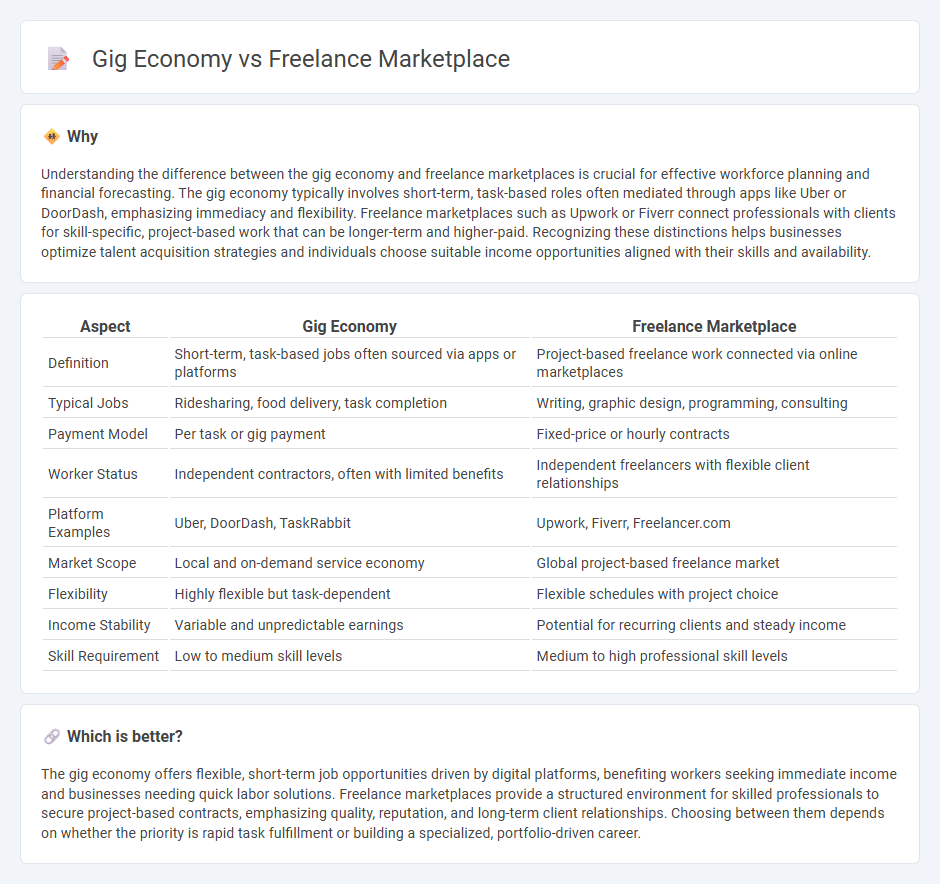
The gig economy encompasses a broad range of short-term, flexible jobs often facilitated by digital platforms connecting workers and clients worldwide. Freelance marketplaces specifically focus on project-based work where professionals offer specialized services, such as graphic design, writing, or software development. Explore the nuances between these models to understand their impact on workforce dynamics and economic growth.
Why it is important
Understanding the difference between the gig economy and freelance marketplaces is crucial for effective workforce planning and financial forecasting. The gig economy typically involves short-term, task-based roles often mediated through apps like Uber or DoorDash, emphasizing immediacy and flexibility. Freelance marketplaces such as Upwork or Fiverr connect professionals with clients for skill-specific, project-based work that can be longer-term and higher-paid. Recognizing these distinctions helps businesses optimize talent acquisition strategies and individuals choose suitable income opportunities aligned with their skills and availability.
Comparison Table
| Aspect | Gig Economy | Freelance Marketplace |
|---|---|---|
| Definition | Short-term, task-based jobs often sourced via apps or platforms | Project-based freelance work connected via online marketplaces |
| Typical Jobs | Ridesharing, food delivery, task completion | Writing, graphic design, programming, consulting |
| Payment Model | Per task or gig payment | Fixed-price or hourly contracts |
| Worker Status | Independent contractors, often with limited benefits | Independent freelancers with flexible client relationships |
| Platform Examples | Uber, DoorDash, TaskRabbit | Upwork, Fiverr, Freelancer.com |
| Market Scope | Local and on-demand service economy | Global project-based freelance market |
| Flexibility | Highly flexible but task-dependent | Flexible schedules with project choice |
| Income Stability | Variable and unpredictable earnings | Potential for recurring clients and steady income |
| Skill Requirement | Low to medium skill levels | Medium to high professional skill levels |
Which is better?
The gig economy offers flexible, short-term job opportunities driven by digital platforms, benefiting workers seeking immediate income and businesses needing quick labor solutions. Freelance marketplaces provide a structured environment for skilled professionals to secure project-based contracts, emphasizing quality, reputation, and long-term client relationships. Choosing between them depends on whether the priority is rapid task fulfillment or building a specialized, portfolio-driven career.
Connection
The gig economy and freelance marketplaces are interconnected as platforms that facilitate flexible, short-term work arrangements outside traditional employment. Freelance marketplaces provide digital infrastructure where gig workers can find projects, negotiate terms, and receive payment efficiently. This relationship accelerates labor market fluidity and enables businesses to access diverse skill sets on demand.
Key Terms
Platform Intermediation
Freelance marketplaces operate as structured platforms connecting clients with skilled professionals seeking project-based work, emphasizing transparency, secure payment systems, and dispute resolution. Gig economy platforms, by contrast, often facilitate on-demand services with a focus on speed, flexibility, and short-term engagements rather than long-term professional relationships. Explore the nuances of platform intermediation and how these models shape modern work better by learning more.
Flexibility of Work
Freelance marketplaces offer a structured platform connecting skilled professionals with clients, providing flexibility in project selection and work hours tailored to individual preferences. The gig economy emphasizes short-term, task-based jobs often accessed via apps, granting workers immediate opportunities but with varying degrees of control over work conditions. Explore in-depth comparisons to understand which model best enhances your work-life balance and career goals.
Payment Structure
Freelance marketplaces typically use milestone-based or project-based payment structures with escrow services, ensuring secure transactions between clients and freelancers. In contrast, the gig economy often relies on per-task or hourly payments processed through unified platforms, emphasizing speed and volume over contractual formality. Explore the nuances of each payment model to choose the best fit for your work style.
Source and External Links
What Is a Freelance Marketplace? Basics and Best Options - A freelance marketplace is an online platform connecting independent professionals with companies needing specific services, facilitating remote and often computer-based work such as writing, design, and consulting.
The Ultimate List Of 31 Top Freelance Marketplaces In 2025 - Freelancer is highlighted as a top platform with over 60 million freelancers, providing wide job variety and secure milestone payments but charging fees up to 10% per project.
Upwork | Hire Top Freelance Talent with Confidence - Upwork is the world's largest freelance marketplace offering AI-powered hiring, free job posting, 5% fees after hiring, and options tailored to businesses from startups to enterprises.
 dowidth.com
dowidth.com